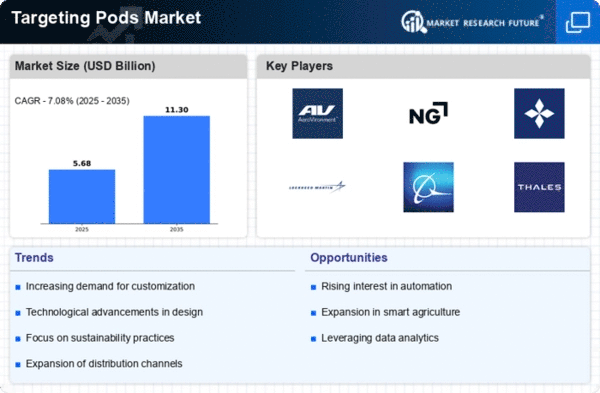Market Analysis
In-depth Analysis of Targeting Pods Market Industry Landscape
The Targeting Pods Market operates at the forefront of modern military aviation, driven by the increasing need for advanced targeting and surveillance capabilities in complex operational environments. A primary driver in this market is the growing demand for targeting pods equipped with cutting-edge sensors, cameras, and laser designators to enhance precision targeting, reconnaissance, and intelligence gathering. As global security challenges evolve, armed forces invest in targeting pods for a range of platforms, including fighter jets, unmanned aerial vehicles (UAVs), and reconnaissance aircraft. The market caters to the imperative of developing versatile, high-performance targeting pods that enable military forces to conduct accurate and mission-critical operations.
Technological advancements in targeting pod systems contribute significantly to the dynamics of the market. Innovations in sensor technologies, electro-optical and infrared (EO/IR) imaging, laser designator capabilities, and data processing enhance the overall performance and effectiveness of targeting pods. Technology plays a crucial role in ensuring that these systems meet the evolving demands of modern warfare, providing defense forces with the capability to conduct precision strikes, conduct surveillance, and gather intelligence in contested and dynamic operational environments.
Geopolitical considerations and evolving security threats play a central role in shaping the targeting pods market. Nations and defense forces prioritize the development and procurement of advanced targeting pod systems to maintain a technological edge and address emerging threats. The market responds to these strategic imperatives by offering cutting-edge technologies that provide superior targeting accuracy, range, and versatility, ensuring the effectiveness of military aircraft in a variety of mission scenarios.
Budgetary considerations and defense spending influence the targeting pods market. Governments allocate resources to research, develop, and deploy targeting pod systems that align with their strategic defense priorities and operational requirements. The market's growth is influenced by the economic feasibility of investing in advanced targeting capabilities that offer a balance between cutting-edge technology and cost-effectiveness. Economic fluctuations, geopolitical tensions, and defense budget allocations impact the pace and scale of procurement, requiring targeting pod manufacturers to navigate a dynamic landscape.
Collaborations and partnerships between defense contractors, research institutions, and governments contribute to the market dynamics. Joint development programs, international collaborations, and technology transfers play a pivotal role in advancing targeting pod capabilities and fostering interoperability among allied forces. These partnerships allow nations to pool resources, share technological expertise, and collectively address evolving security challenges, shaping the landscape of the targeting pods market.
Operational requirements and mission profiles influence the customization and integration of targeting pods onto various airborne platforms. Different military aircraft, including fighter jets, UAVs, and reconnaissance planes, have distinct operational needs, prompting manufacturers to tailor targeting pod solutions to specific mission profiles. The market caters to these diverse requirements by offering modular and adaptable targeting pod systems optimized for air-to-ground strikes, surveillance, and intelligence, surveillance, and reconnaissance (ISR) missions.
Testing and validation efforts are crucial components of the targeting pods market. Manufacturers and defense organizations conduct extensive testing to ensure the reliability, accuracy, and durability of targeting pod systems in real-world conditions. Successful tests and demonstrations contribute to the market's credibility and drive further investment in targeting pod technologies as indispensable tools for enhancing military capabilities.



















Leave a Comment